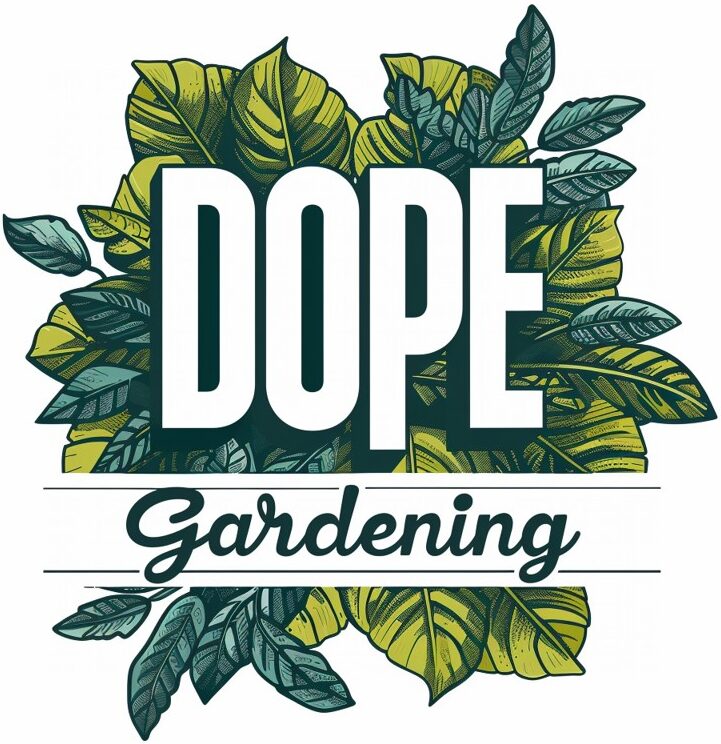Tips to Use Epsom Salt in Garden: Easy Ways to Boost Plant Health
Gardening enthusiasts are always on the lookout for simple and effective ways to boost plant growth and health. One popular method is using Epsom salt in the garden. Understanding how to use Epsom salt can help you nurture a thriving garden with beautiful blooms and vigorous plants.
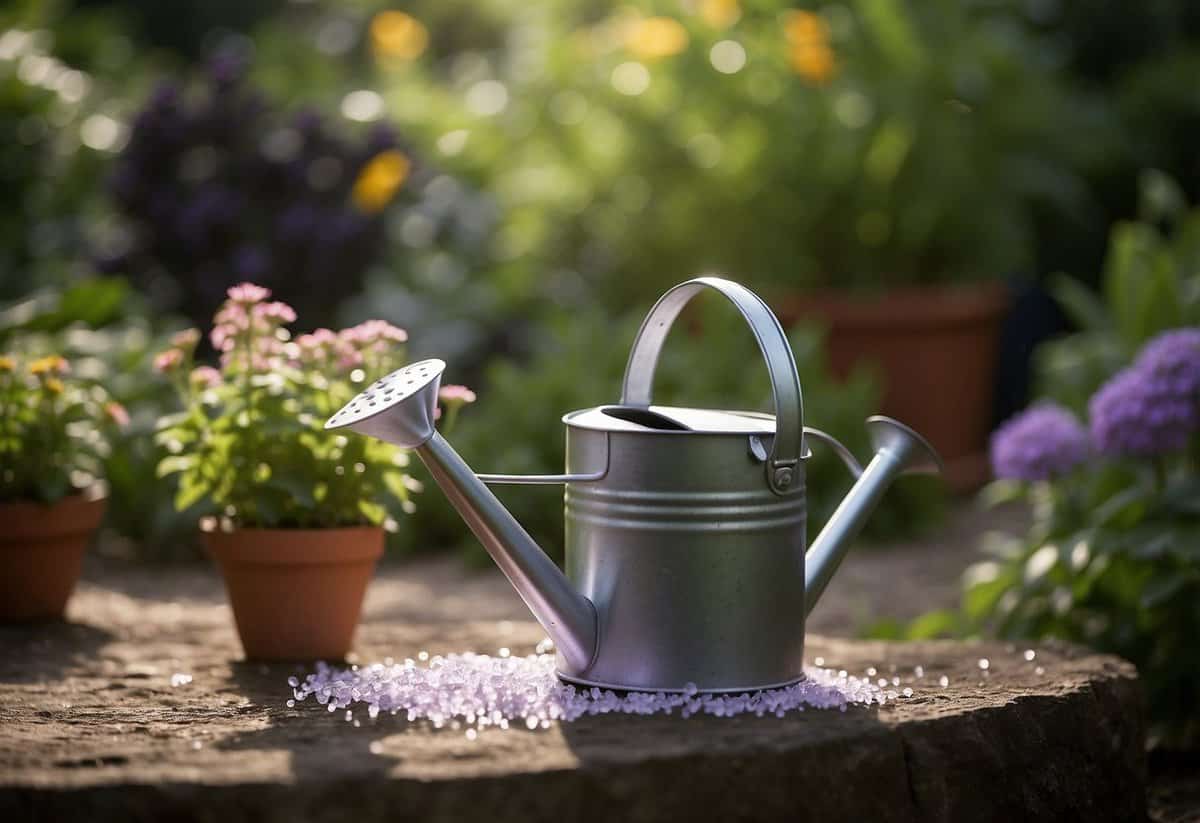
Epsom salt, which is rich in magnesium, offers various benefits for different types of plants. By incorporating it into your gardening routine, you can address specific needs of your plants and enhance their overall wellbeing.
1) Promote Seed Germination

To help your seeds sprout, you can use Epsom salt. Mix one tablespoon of Epsom salt in one gallon of water.
Water your soil with this mix before you plant the seeds. This gives them magnesium, which helps them grow.
You can repeat this every few weeks to keep the soil rich in nutrients.
2) Boost nutrient absorption

Epsom salt can help your plants absorb nutrients better.
To use it, mix one to two tablespoons of Epsom salt with a gallon of water.
Water your plants with this solution every few weeks for best results.
By doing this, you can improve the availability of key nutrients like magnesium and sulfur for your plants.
3) Improve Flower Blooming

Epsom salt can help make your flowers bloom more vividly. To do this, dissolve one tablespoon of Epsom salt in a gallon of water. This solution can be sprayed directly onto the leaves or poured into the soil around the base of your plants.
Use this mixture once a month. It provides an extra boost of nutrients that can lead to brighter and more numerous blooms. Check your soil’s magnesium levels first, as not all soils need this supplement.
For an easy application, you can also sprinkle a tablespoon of Epsom salt around the base of your flowering plants and gently work it into the soil with a trowel. This method slowly releases nutrients into the soil.
4) Deter Pests Naturally

Using Epsom salt can be an effective way to keep pests away from your garden.
Mix 1 cup of Epsom salt with 5 gallons of water and spray it on plant foliage. This helps deter beetles and other insects.
Epsom salt creates a barrier that pests find hard to cross, protecting your plants without harming beneficial insects.
For smaller gardens, mix 1-2 tablespoons of Epsom salt with 1 gallon of water in a spray bottle. Spraying this mixture on your plants helps keep pests at bay naturally. Learn more about this method from Gardening Know How here.
5) Prevent Root Rot

Root rot can damage your plants quickly. To help prevent it, try adding Epsom salt to your garden routine.
First, remove any affected roots with sterilized shears. Then, mix one tablespoon of Epsom salt in a gallon of water. Use this mix to water your plants.
This helps improve soil drainage and reduces the risk of root rot. Regularly using Epsom salt can help keep your plants healthy.
6) Enhance Soil Health

Adding Epsom salt to your garden can help improve soil health. The magnesium in Epsom salt aids in the absorption of nutrients like nitrogen and phosphorus, which are crucial for plant growth.
Sprinkling Epsom salt around the base of your plants can provide these essential nutrients. You can also dissolve it in water and apply it directly to the soil for better results. This practice can lead to healthier and more vibrant plants.
For more detailed information, you can check out how Epsom salt enhances soil health.
7) Relieve Plant Stress

Epsom salt can help reduce transplant shock when you move plants from pots to your garden. This stress happens because the roots need time to adjust to the new environment.
Before transplanting, mix a tablespoon of Epsom salt with a gallon of water. This solution provides magnesium, which supports root strength and plant growth.
Spray or water your plants with this Epsom salt mixture before and after transplanting. The extra magnesium helps plants recover more quickly and thrive in their new location.
8) Compost additive
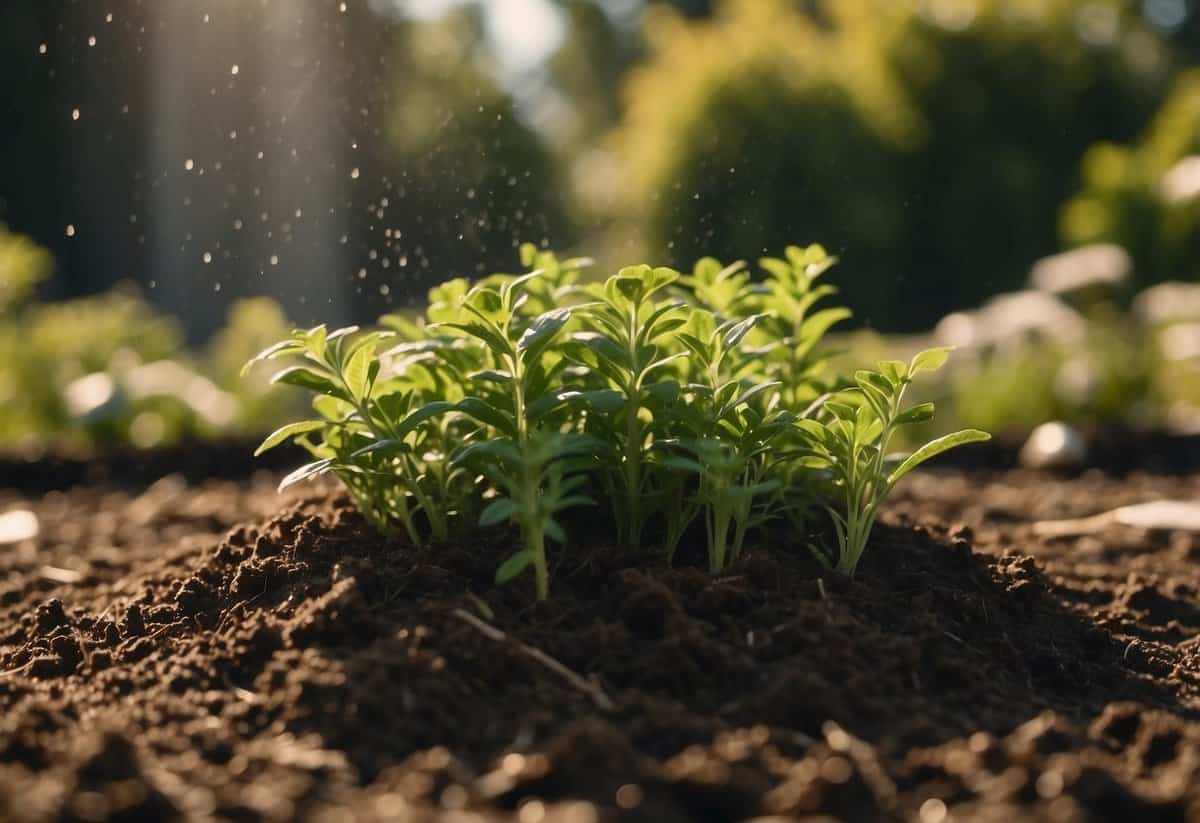
Adding Epsom salt to your compost pile can improve its quality. Epsom salt helps balance the pH level, which is crucial for effective decomposition.
Use one tablespoon of Epsom salt per gallon of water, and apply this solution to the compost every 2-4 weeks. This ensures even distribution.
Epsom salt can create a favorable environment for the breakdown of organic matter, leading to richer compost. Your garden will benefit from the added nutrients when you use this enhanced compost.
Increase Chlorophyll Production

Epsom salt can boost chlorophyll production in your plants, making them greener and healthier. Chlorophyll is crucial for photosynthesis, the process plants use to make food.
Adding Epsom salt, which contains magnesium, helps plants produce more chlorophyll. You can dissolve a tablespoon of Epsom salt in a gallon of water and apply it to the soil around your plants.
This mix can be sprayed directly onto the leaves for faster absorption. Regularly treating your plants with Epsom salt helps them stay vibrant and strong. For more details, check out these helpful spring gardening tips.
10) Facilitate nutrient exchange
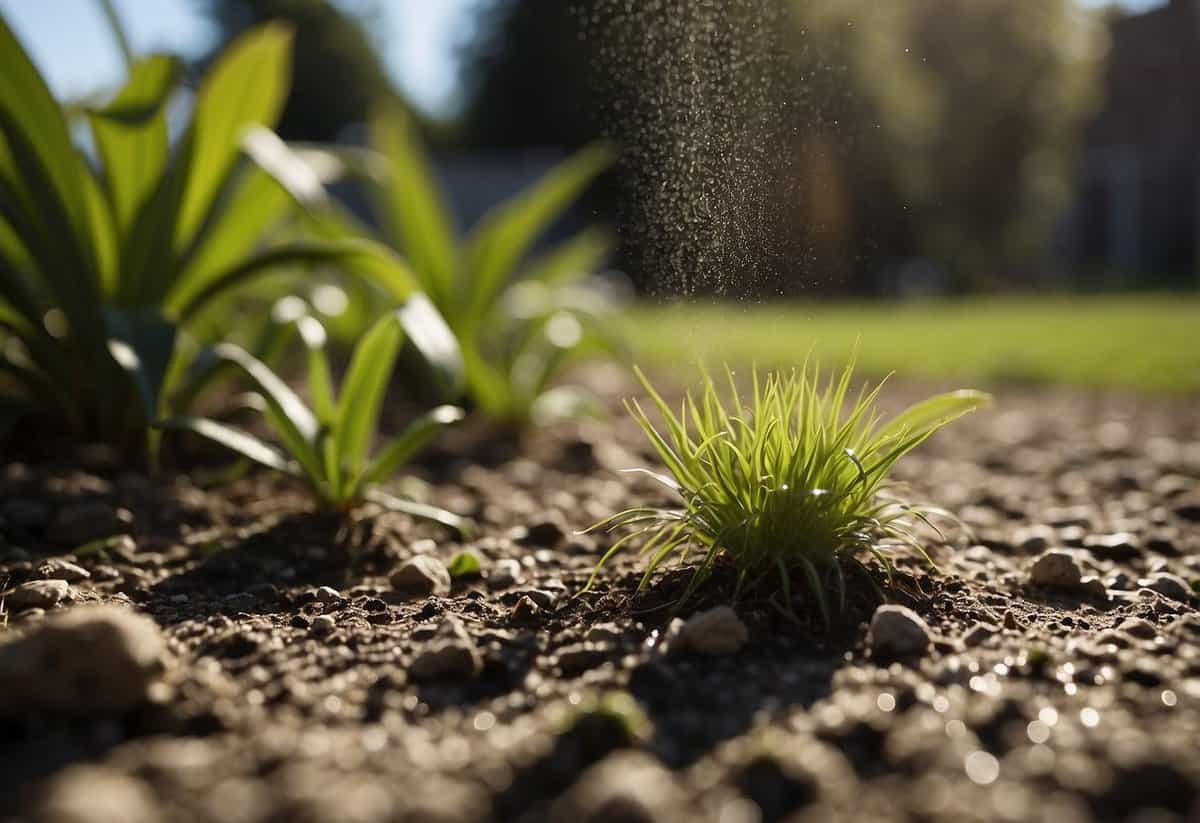
Epsom salt helps improve the uptake of key nutrients like nitrogen and phosphorus. These elements are important for plant growth.
To use Epsom salt for this purpose, dissolve one tablespoon in a gallon of water. Apply this solution to the soil around your plants.
Doing this every month can aid nutrient exchange and keep your plants healthy.
Benefits Of Using Epsom Salt In The Garden

Epsom salt can provide several advantages for your garden, such as boosting plant growth and enhancing soil quality.
Enhancing Plant Growth
Epsom salt is rich in magnesium, which is vital for plant growth. When you mix Epsom salt with water and apply it to your plants, it can help produce more flowers and larger fruits. This is especially beneficial for flowering plants and vegetables.
Magnesium aids in chlorophyll production. This means plants can use sunlight more effectively. As a result, they grow healthier and stronger.
You can dissolve one to two tablespoons of Epsom salt in a gallon of water. Use this mix to water your plants, or spray it on their leaves every month for noticeable results. This simple routine can lead to lush, thriving plants in your garden.
Improving Soil Quality
Epsom salt can also improve the quality of your soil. It helps neutralize pH levels, making the soil more balanced. Some plants struggle to grow in very alkaline soil.
By adding Epsom salt, you can make the soil more suitable for these plants. To lower the soil’s pH, work Epsom salt into the ground around your plants. This can enhance soil structure, promoting better root growth.
Furthermore, using Epsom salt can increase nutrient absorption. This means your plants can take in more essential nutrients from the soil, leading to better overall health. Applying Epsom salt every few weeks can make a big difference in the vitality of your garden.
How To Apply Epsom Salt For Different Plants

Epsom salt is a helpful tool for various types of plants. When used correctly, it can promote healthy growth and blooms.
Vegetable Gardens
In your vegetable garden, Epsom salt can help boost the yield and growth of plants. Dissolve one to two tablespoons of Epsom salt in a gallon of water. Apply this solution at the base of the plants once a month during the growing season.
For tomatoes and peppers, you can use one tablespoon of Epsom salt per foot of plant height. Sprinkle this around the base and then water it in. This can help prevent blossom-end rot and enhance overall plant health.
If you have cucumbers, beans, or leafy greens, a monthly application of the diluted Epsom salt solution can benefit them as well.
Flower Beds
Epsom salt can enhance the blooms in your flower beds. Mix two tablespoons of Epsom salt in a gallon of water. Apply this once a month.
For roses, sprinkle half a cup of Epsom salt around the base before watering. This can help produce more vibrant and abundant blooms.
If you have flowering shrubs like azaleas or rhododendrons, use one tablespoon per nine square feet of root area. Apply every two to four weeks and water well to increase magnesium uptake, which is vital for flower production.
Lawns
Applying Epsom salt to lawns can help greens up the grass. For general application, use three pounds of Epsom salt for every 1,250 square feet of lawn area. This can be applied using a lawn spreader or diluted in water and sprayed.
To create a spray solution, dissolve one tablespoon of Epsom salt per gallon of water and spray the lawn during watering. Apply this every four weeks during the growing season for best results.
With correct use, Epsom salt can help improve the appearance and health of your lawn, making it greener and more vibrant.
Precautions And Considerations
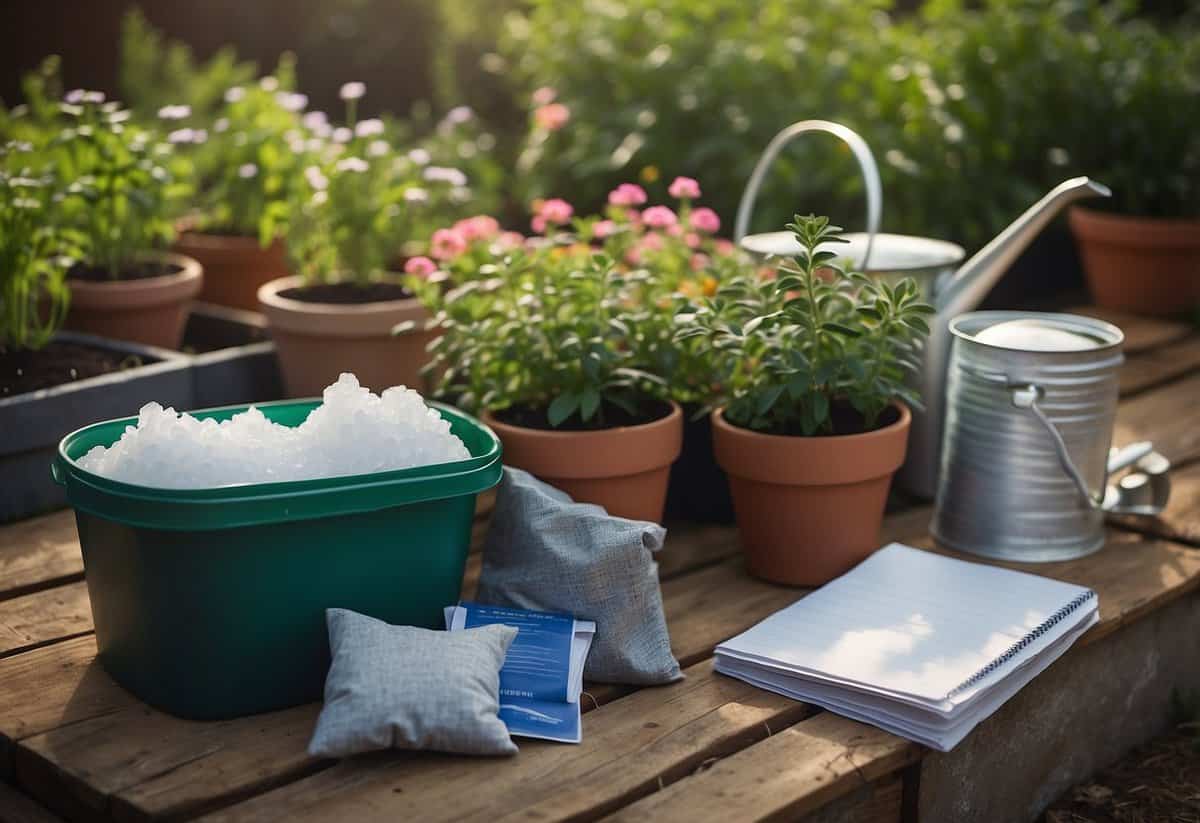
When using Epsom salt in your garden, you should be aware of the correct dosage and the potential risks involved. Knowing how much to use and what hazards to avoid can help ensure your plants thrive.
Proper Dosage
It’s important to use the right amount of Epsom salt. Applying too much can harm your plants. Generally, you can mix 1 tablespoon of Epsom salt in a gallon of water for most plants. For flowering plants, use a few tablespoons per gallon of water once a month.
For lawns, you can apply 3 pounds per 1,250 square feet with a spreader or dilute it in water and use a sprayer. When planting shrubs or trees, add 1 or 2 tablespoons per 9 square feet.
Potential Risks
Using Epsom salt incorrectly can lead to several issues. Too much Epsom salt may cause salt buildup in the soil, which can prevent plants from absorbing other crucial nutrients.
Make sure to test your soil for magnesium levels before applying Epsom salt. Not all soil needs extra magnesium, and adding it when it’s not necessary could harm your plants.
Also, be cautious when using Epsom salt on seedlings or young plants. They can be more sensitive to salt, and overuse might stunt their growth or cause root damage. Regularly monitor your plants for any signs of distress after application.
